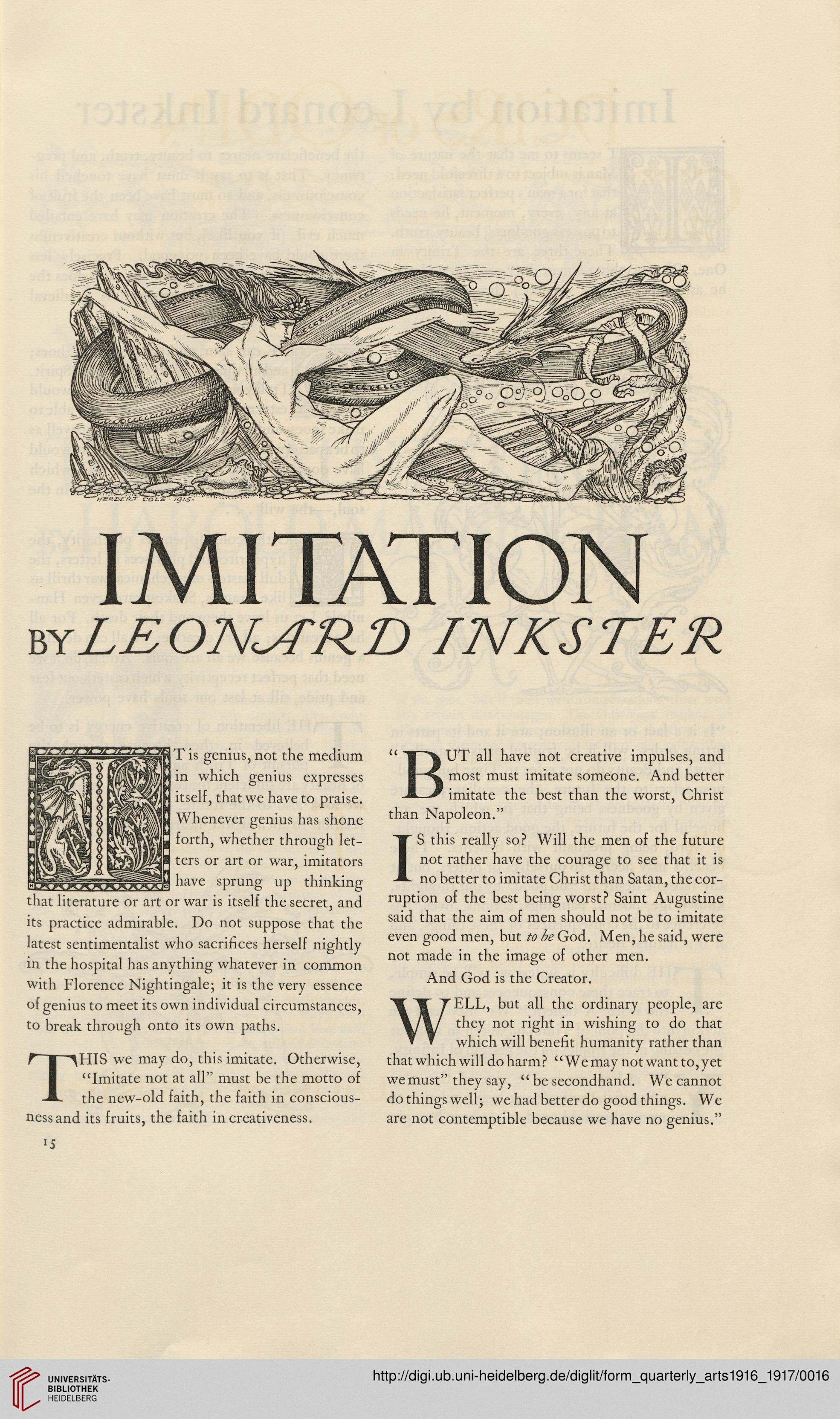tyzZR.E'SrAjr c*o/-2=T /g/S* ’ 5; ' •***:‘ ' *—**-
IMITATION
mLEON^TRD INKSTER
T is genius, not the medium
in which genius expresses
itself, that we have to praise.
Whenever genius has shone
forth, whether through let-
ters or art or war, imitators
have sprung up thinking
that literature or art or war is itself the secret, and
its practice admirable. Do not suppose that the
latest sentimentalist who sacrifices herself nightly
in the hospital has anything whatever in common
with Florence Nightingale; it is the very essence
of genius to meet its own individual circumstances,
to break through onto its own paths.
THIS we may do, this imitate. Otherwise,
“Imitate not at all” must be the motto of
the new-old faith, the faith in conscious-
nessand its fruits, the faith in creativeness.
15
“ UT all have not creative impulses, and
most must imitate someone. And better
-JL—J imitate the best than the worst, Christ
than Napoleon.”
IS this really so? Will the men of the future
not rather have the courage to see that it is
no better to imitate Christ than Satan, the cor-
ruption of the best beingworst? Saint Augustine
said that the aim of men should not be to imitate
even good men, but to be God. Men, he said, were
not made in the image of other men.
And God is the Creator.
WELL, but all the ordinary people, are
they not right in wishing to do that
which will benefit humanity rather than
thatwhichwill doharm? “Wemay notwantto,yet
wemust” they say, “ be secondhand. We cannot
dothings well; we hadbetter do good things. We
are not contemptible because we have no genius.”
IMITATION
mLEON^TRD INKSTER
T is genius, not the medium
in which genius expresses
itself, that we have to praise.
Whenever genius has shone
forth, whether through let-
ters or art or war, imitators
have sprung up thinking
that literature or art or war is itself the secret, and
its practice admirable. Do not suppose that the
latest sentimentalist who sacrifices herself nightly
in the hospital has anything whatever in common
with Florence Nightingale; it is the very essence
of genius to meet its own individual circumstances,
to break through onto its own paths.
THIS we may do, this imitate. Otherwise,
“Imitate not at all” must be the motto of
the new-old faith, the faith in conscious-
nessand its fruits, the faith in creativeness.
15
“ UT all have not creative impulses, and
most must imitate someone. And better
-JL—J imitate the best than the worst, Christ
than Napoleon.”
IS this really so? Will the men of the future
not rather have the courage to see that it is
no better to imitate Christ than Satan, the cor-
ruption of the best beingworst? Saint Augustine
said that the aim of men should not be to imitate
even good men, but to be God. Men, he said, were
not made in the image of other men.
And God is the Creator.
WELL, but all the ordinary people, are
they not right in wishing to do that
which will benefit humanity rather than
thatwhichwill doharm? “Wemay notwantto,yet
wemust” they say, “ be secondhand. We cannot
dothings well; we hadbetter do good things. We
are not contemptible because we have no genius.”




